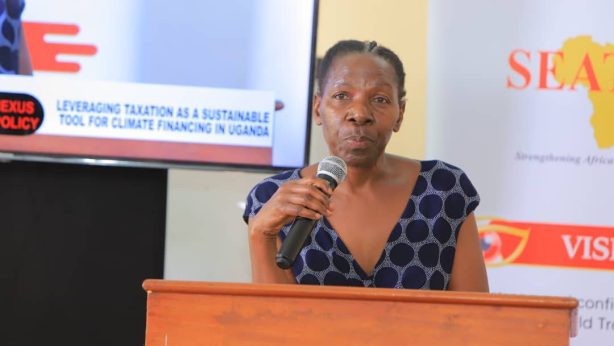SEATINI Uganda and MoGLSD hold high-level consultative meeting on mainstreaming Trade and Investment policy issues in the NAP on Business and Human Rights
During the 2nd Universal periodic Review in 2016, one of the recommendations to Uganda was to develop an action plan on Business and Human Rights to implement the United Nations (UN) Guiding Principles. The Government of Uganda accepted the recommendation and embarked on the process of developing a National Action Plan (NAP) on Business and Human Rights. Following a discussion by the Inter-ministerial Committee on Human Rights in a training organised by the Ministry of Foreign Affairs and UN Human Rights, the Ministry of Gender Labour and Social Development (MoGLSD) was identified to coordinate the development of a National Action Plan on Business and Human Rights.
The National Action Plan on Business and Human rights seeks to promote a harmonious relationship in which both businesses and communities can thrive by providing a comprehensive framework that coordinates multi-sectoral efforts to ensure respect for human rights by business operations and also clarifies business responsibilities towards respect for human rights in their operations and enhances equitable and effective access to remedy to victims of human rights violations and abuses arising from business related activities.
To ensure a comprehensive National Action Plan that mainstreams issues of trade and investment, including the policy and practice, SEATINI Uganda together with the MoGLSD held a high-level technical consultative meeting on 12th August 2020. This meeting provided a platform for stakeholders to discuss and agree on trade and investment related issues for consideration.
While giving opening remarks, the Commissioner MoGLSD, Mr. Bernard Mujuni, noted that there are many issues and imbalances that need to be investigated when it comes to business and human rights and therefore the National Action Plan will be a useful tool while carrying out these investigations.
According to Ambassador Nathan Irumba, emerging economies like India, Brazil, South Africa and China were once in the Least Developed Countries bracket but they took advantage of the policy space that was provided to poor countries and they were able to become developed countries. He added that these emerging developing countries have become a big factor in development of trade.
Some of key issues discussed during the meeting included;
• The idea that businesses have responsibilities and obligations for human rights is well ensconced in global norms. Yet despite this widespread recognition, most trade and investment laws are silent on the matter. As a result, this leads to rampant violation of labour rights;
• Trade and Investment Agreements are negotiated. If they are poorly negotiated, they can have far reaching implications;
• Trade and Investment are some of the highly regulated sectors in the world;
• Trade and Investment Agreements can work for development i.e. create jobs in various sector and also create revenues for government. On the contrary, some trade and investment agreements have led to further marginalization of the poor;
• Introducing investor obligations for human rights can act as a vehicle by which business and human rights norms, generally, can be enforced;
• US- Kenya Free Trade Agreement has dire implications on the East African Community;
• Regional cooperation can potentially enable African countries to be in charge of their own data;
Below are some of the issues that were considered for inclusion in the National Action Plan are;
• Strengthen access to remedy mechanisms against business-related human rights abuses and violations;
• Improve access to legal services to communities affected by business-related human rights violations and abuses;
• Strengthen coordination between State Actors;
• Empower communities especially vulnerable persons to claim for their rights;
• Promoting compliance to human rights observance;
• Capacity building for business operators on human rights observance.



